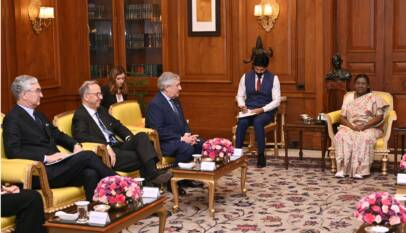Tensions Flare in Sambhal Over Mosque Survey Amid Stone Pelting and Police Action
On November 24, tensions reached a boiling point in Sambhal, Uttar Pradesh, during the second survey of the Shahi Jama Masjid, a Mughal-era mosque, as ordered by the local court. The survey, intended to investigate claims that the mosque was constructed on the site of an ancient Hindu temple, sparked violent protests. Amid heavy police deployment, a section of the gathered crowd began pelting stones, prompting the police to use tear gas and “mild force” to restore order.
The controversy began earlier in the week when the court-appointed “Advocate Commission” conducted an initial survey. The commission was tasked with videography and photography of the mosque premises as part of an investigation into claims made in a petition that a Harihar temple once stood on the site. These claims were based on historical texts like Babarnama and Ain-e-Akbari, which allegedly mention the demolition of a temple by Mughal Emperor Babur in 1529.
Violence Erupts During Second Survey
On Sunday morning, the survey resumed under tight security. However, as the team commenced work, a large crowd gathered at the site. According to Superintendent of Police Krishna Kumar Vishnoi, some individuals in the crowd began throwing stones at the police and survey teams. The police responded with tear gas and minimal force to disperse the mob. Several videos of the incident have surfaced online, showing clashes between protesters and law enforcement personnel.
District Magistrate Rajendra Pensia confirmed that despite the disruptions, the survey was completed, and the commission is set to submit its findings to the court on November 29. The authorities have assured strict action against those involved in the violence, with police identifying and apprehending stone-pelters and their instigators.
Political Reactions and Legal Implications
The incident has drawn sharp political reactions. Uttar Pradesh Deputy Chief Minister Keshav Prasad Maurya condemned the violence, stating that obstructing a court-mandated survey is unacceptable. He assured that the government would take strict legal action against those disrupting the peace and hindering the investigation.
Samajwadi Party (SP) spokesperson Ameek Jami criticized the ruling BJP, accusing it of reigniting communal tensions. Jami alleged that the survey was politically motivated and aimed at dividing communities post-election. He referenced the Places of Worship Act 1991, which protects the status of religious sites as they were on August 15, 1947, except for the Babri Masjid-Ram Janmabhoomi dispute.
Congress leader Udit Raj echoed similar sentiments, calling for an end to actions that inflame communal tensions. Meanwhile, the BJP defended the court-ordered survey as a legitimate legal process and criticized opposition parties for politicizing the matter.
Historical Context and Broader Implications
The Shahi Jama Masjid dispute is one of many cases where claims of Hindu temples being replaced by Islamic structures have led to legal battles. The petitioners, represented by Supreme Court lawyer Vishnu Shankar Jain, argue that historical texts and architectural evidence support their claims. Jain, along with his father Hari Shankar Jain, has been involved in multiple high-profile cases concerning disputed religious sites, including the Gyanvapi Mosque-Kashi Vishwanath Temple case.
For local residents, the issue is deeply emotive. While some support the survey as a step toward reclaiming historical heritage, others view it as an unnecessary provocation. The clashes in Sambhal reflect the growing tensions surrounding such disputes, which often become flashpoints for communal unrest.
Moving Forward
The next court hearing on the matter is scheduled for January 29, 2025. Until then, the administration faces the challenge of maintaining peace and ensuring the impartiality of the judicial process. The incident in Sambhal highlights the complexities of balancing legal obligations with maintaining social harmony in a diverse and sensitive region like Uttar Pradesh.
The outcome of this case will likely have far-reaching implications, not only for the parties involved but also for the broader discourse on historical and religious identity in India.
Lieutenant Governor of Puducherry meets Prime Minister
The Lieutenant Governor of Puducherry, Shri K. Kailashnathan met the Prime Minister Shri N…



















